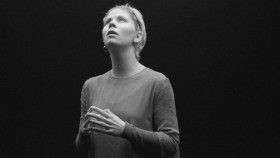


Cinemateket August-September 2015
Jeg skrev om Helmut Berger, som Luchino Visconti gjorde til stjerne med ”Ludwig”, skuespilleren som blev kaldt for verdens smukkeste mand. Og så åbner jeg det danske Cinematekets katalog for august og september og ser en anden Visconti-skuespiller på forsiden, Alain Delon, som er født i 1935, bliver 80 i november måned! ”Leoparden” (1963, 185 minutter)… dansen med Claudia Cardinale, spillet med Burt Lancaster, et af Viscontis mange mesterværker, for glem ikke også at se ”Rocco og hans brødre” (1961, 177 minutter), hvor han spiller overfor Annie Girardot og med Renato Salvatori i rollen som broren, som går i hundene i norditalienske Milano, hvortil den sicilianske familie er flyttet fra fattigdommen.
… to af 10 film med Delon, to andre der lige skal nævnes er Jean-Pierre Melvilles stilsikre, elegante ”Ekspert i Drab” (1967) og samme instruktørs ”Den røde cirkel” (1970), hvor også stilsikre og elegante Yves Montand deltager i det store kup.
Det er den rene fryd at bladre i Cinematekets indbydende 64 sider store katalog, kuglepennen kommer frem, der bliver sat krydser, diskuteret med den bedre halvdel, vel vidende at vi alligevel ikke får tid til alt det vi gerne vil se eller gense.
For det er hvad kataloget byder på – retrospektive serier (Delon, Bogdanovich, Hasse og Tage, Rifbjerg på film…) og nye film, som aldrig vil kunne ses i biograferne. Lad mig nævne ”Arabian Nights”, som udover den berømmede dokumentarfilm ”The Square” af Jehane Noujaim (2013) også viser ”Mother of the Unborn” (2014) af ægyptiske Nadine Salib, som fik en Jury Special Award i First Appearance afdelingen ved IDFA 2014. Jeg havde fornøjelsen at være en af hendes konsulenter ved en workshop i Cairo for et par år siden, hun brændte for sin film, som hun i et interview i forbindelse med IDFA beskrev således:
“I was intrigued by the Egyptian ancient tradition of naming infertile women ‘Mother of the Unborn’, or ‘Um Ghayeb’ in Arabic,..
I’d heard this term used a lot in Upper Egypt and decided to investigate the issue. These women are often stigmatised, even sometimes accused of bringing bad luck.I wanted to make a film about the Mother of the Unborn, but I didn’t exactly know what it would be about. Deep in me, I wanted to meditate on why it was so important for the women in the region to have a baby and why the women in the region were so keen to carry on living in such a harsh environment.”
Og for at blive i regionen… I går havde vi besøg af min kones bror, som bor i New York og spurgte ham om han havde set nogle gode film for nylig. Han nævnte en palæstinensisk film fra Vestbredden om 18 køer, som de israelske myndigheder havde fundet farlige for sikkerheden… og voilá, her er den i kataloget i forbindelse med Salaam Filmfestival, ”The Wanted 18” er titlen og instruktøren Amer Shomali er til stede ved forevisningen af filmen, som svogeren fandt morsom og flot lavet.
Jeg kunne blive ved – foreløbig har vi booket os ind til Richard Linklaters Before-trilogi, et marathon-arrangement med pauser og middag. Og de gratis børnefilm, vi kommer med den fire-årige! Han kalder det for ”Bedstes Biograf”.
http://www.dfi.dk/Filmhuset/Cinemateket.aspx
